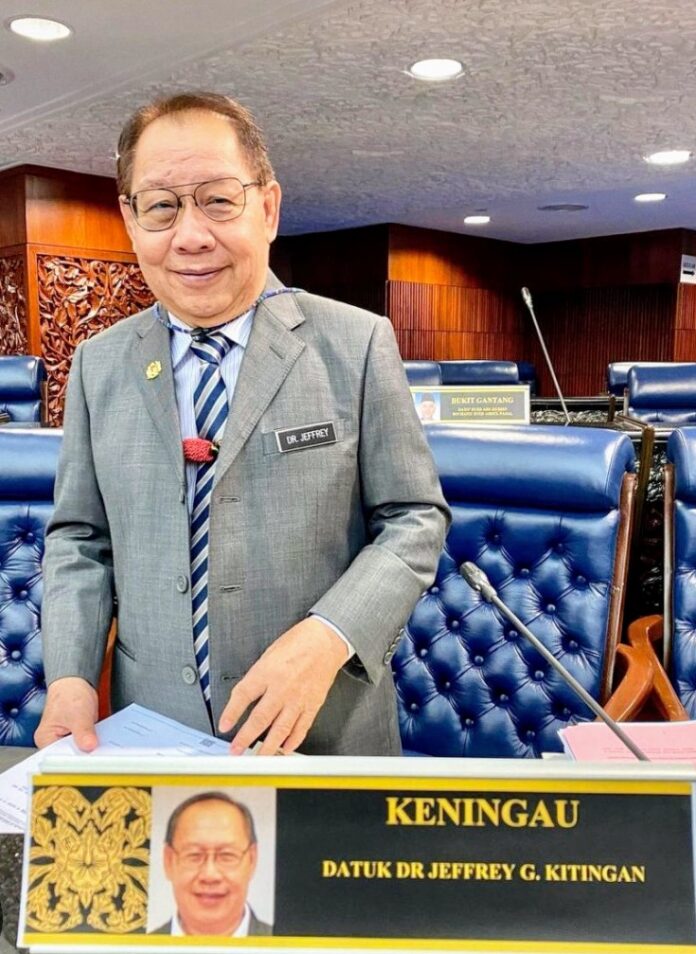KOTA KINABALU: Datuk Seri Panglima Dr Jeffrey Kitingan (Star – Keningau) said Sabah should be allowed to forge its own future independently of political influences from West Malaysia.
According to a reports by the Vibes, Dr Jeffrey said the political dominance from peninsula-based powers had an adverse effect on Sabah’s autonomy and has resulted in regression, impoverishment, and insecurity for decades.
“When the Sabah assembly and parliamentary seats are predominantly controlled by parties from the peninsula, Sabah loses its autonomy and independence, resembling a form of proxy colonialism,” Jeffrey, who is a Sabah deputy chief minister, asserted in parliament Tuesday
He recalled that many who had been vocal on Malaysia Agreement 1963 (MA63), state rights and the Sabah constitution under the regimes were victimised, including himself, who had been detained over two years under the now-abolished Internal Security Act.
Jeffrey said he is coming out with all of these in parliament so it can serve as a reminder to the government to stop history from repeating itself.
The political powers’ intervention in state affairs included the use of the two-year chief minister rotation system in the 1990s, which he said paved the way to political dominance of West Malaysian leaders over Sabah.
“Gradually, Sabah became the poorest state in Malaysia, despite its wealth in natural resources, oil and gas.
“Out of 10 poorest districts in Malaysia, eight are in Sabah, as well as the highest number of illnesses and illiteracy rate.
“Today, Sabah still lacks clean water, electricity and the roads are bad, resembling the moon, with insufficient basic infrastructure, while the roads are already multi-tiered in the peninsula,” he said.
Jeffrey said allocations and focus were also heavily skewed towards Malaya-centric, with 80% to 90% of development going to the peninsula, while the rest to Sabah and Sarawak.
“The development allocation of RM5 billion and RM6 billion per year for Sabah and Sarawak respectively is on paper, with RM1 billion (or) more spent and the balance carried over to the next year,” Jeffrey said.
“The remaining unspent allocations in the year in question should be sent to the respective Sabah and Sarawak development trust accounts to continue with the construction of the projects in question and not be withdrawn.”
Towards this end, he called Putrajaya to fully implement MA63, including the rights and privileges and recommendations outlined in the federal constitution, Inter-governmental Committee Report and MA63.
“The 40% net revenue rights shall be paid immediately, not as a mere gesture with RM300 million, alongside other financial rights, such as duties and excise taxes, such as the 10% oil export duty, and returns from natural resources such as oil and gas, which should be returned to the governments of Sabah, Sarawak, Kelantan, and Terengganu,” he said.
Jeffrey said Putrajaya should no longer use the lack of funds as an excuse not to honour Sabah’s revenue rights as it has collected the revenue from the state for over 50 years.
Jeffrey said the government should also restore the 35% quota for parliamentary seats for Sabah and Sarawak to protect their rights within the constitution, stating that the Borneo states have agreed to join Malaysia based on the assurance that their rights would be protected, which was decided by the resolutions of their respective assemblies in 1962.
“Respect the political franchise rights of Sabah and Sarawak. The governments of Sabah and Sarawak should be led by local political parties, not external ones. Do not allow Malayan political parties to enter and take seats in Sabah and Sarawak. You already have more than enough seats in Malaya, 65%,” he said.

